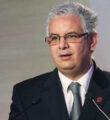Cut Methane Emissions to Avert Global Temperature Rise, UN-backed Study Urges
New York (United Nations) – Methane emissions caused by human activity can be reduced by up to 45 per cent this decade, thus helping to keep global temperature rise to 1.5 degrees Celsius in line with the Paris Agreement on climate change, according to a UN-backed report published on Thursday.
The Global Methane Assessment outlines the benefits of mitigating methane, a key ingredient in smog, which include preventing some 260,000 premature deaths and 775,000 asthma-related hospital visits annually, as well as 25 million tonnes in crop losses.
The study is the work of the Climate and Clean Air Coalition (CCAC), a global partnership of governments and non-State partners, and the UN Environment Programme (UNEP).
“Cutting methane is the strongest lever we have to slow climate change over the next 25 years and complements necessary efforts to reduce carbon dioxide. The benefits to society, economies, and the environmental are numerous and far outweigh the cost”, said Inger Andersen, the UNEP Executive Director.
Methane is an extremely powerful greenhouse gas, responsible for around 30 per cent of warming since the pre-industrial era.
Most human-caused methane emissions come from three sectors: fossil fuels, such as oil and gas processing; landfills and waste; and agriculture, chiefly related to livestock.
The report underscores why international action is urgently needed as human-caused methane emissions are increasing faster than at any time since record keeping began in the 1980s.
Even with the COVID-19 pandemic causing an economic slowdown in 2020, which prevented another record year for carbon dioxide (CO2) emissions, data from the United States National Oceanic and Atmospheric Administration (NOAA) shows the amount of methane in the atmosphere reached record levels last year.
However, unlike CO2, which stays in the atmosphere for centuries, methane breaks down quickly and most is gone after a decade, meaning action can rapidly reduce the rate of global warming in the near-term.
Methane accounts for nearly one-fifth of global greenhouse gas emissions, according to Rick Duke, Senior Advisor to John Kerry, the US Special Presidential Envoy on Climate Change.
“The United States is committed to driving down methane emissions both at home and globally—through measures like research and development, standards to control fossil and landfill methane, and incentives to address agricultural methane”, he said.
The Assessment identifies readily available solutions that would reduce methane emissions by 30 per cent by 2030, mainly in the fossil fuel sector. Most, or around 60 per cent, are low cost and half have “negative costs”, meaning companies will make money from taking action.













